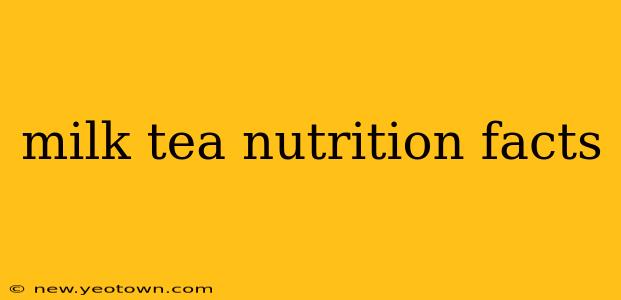Milk tea. The very words conjure images of creamy swirls, comforting warmth, and that satisfying slurp. But beyond the deliciousness, lies a question many of us ponder: what exactly is in that cup of bliss? This isn't just about calories; it's about understanding the nutritional composition of this beloved beverage and making informed choices. Let's embark on a journey into the world of milk tea nutrition facts, uncovering the hidden ingredients and their impact on our health.
What are the main ingredients in milk tea?
The beauty (and sometimes the beast) of milk tea lies in its versatility. The core components are, of course, milk and tea. But variations are endless. We're talking about different types of tea – black, green, oolong – each boasting its unique antioxidant profile. Then there's the milk – whole milk, skim milk, almond milk, soy milk – each with its own fat and protein content. And finally, the sweeteners! Sugar, honey, artificial sweeteners – the options are vast, significantly influencing the overall nutritional value. Don't forget the additions like tapioca pearls (boba), flavored syrups, and even whipped cream, all contributing to the final nutritional profile.
How many calories are in a typical milk tea?
This is the million-dollar question, and sadly, there's no single answer. A small, plain black tea with a splash of skim milk might clock in around 20 calories. However, a large, sugary milk tea loaded with boba and whipped cream can easily exceed 500 calories! The calorie count is wildly variable, hinging on the type of tea, the amount and type of milk, the sweetener used, and those extra additions. Always check the nutritional information provided by the specific tea shop or restaurant.
How much sugar is in milk tea?
Sugar is the major culprit when it comes to milk tea's less-than-stellar nutritional profile. Many milk tea shops generously add sugar, either directly or through flavored syrups. A single serving can contain an alarming amount of added sugar, far exceeding recommended daily allowances. This excess sugar can contribute to weight gain, increase the risk of type 2 diabetes, and negatively impact dental health. Opting for less sugar or sugar-free alternatives can significantly improve the nutritional value.
What are the health benefits of milk tea?
While the sugar content can be a concern, milk tea isn't entirely devoid of health benefits. The tea itself is a rich source of antioxidants, particularly if you choose green or oolong varieties. These antioxidants are linked to various health benefits, including a reduced risk of heart disease, certain cancers, and improved brain function. The milk contributes calcium and protein, essential nutrients for strong bones and muscles. However, it's crucial to remember that these benefits are significantly diminished if the milk tea is heavily laden with sugar and other additives.
Is milk tea good for weight loss?
This is a resounding "it depends." A low-calorie, unsweetened milk tea can be part of a healthy weight loss plan. However, many variations are calorie-dense and high in sugar, hindering weight loss efforts. If weight loss is your goal, consider opting for smaller sizes, unsweetened options, and milk alternatives like skim milk or plant-based milks. Be mindful of added toppings that significantly increase the calorie and sugar content.
What are some healthier alternatives to milk tea?
For a healthier twist, explore options like reducing sugar, choosing unsweetened varieties, opting for plant-based milk alternatives, or selecting teas with fewer calories. Consider homemade milk tea, allowing you to control the ingredients and reduce the sugar content. Exploring different types of tea, like green or oolong tea, can introduce a wide range of beneficial antioxidants into your diet.
Ultimately, mindful consumption is key. Enjoy your milk tea, but do so with awareness of its nutritional composition. By understanding the factors influencing its calorie and sugar content, you can make more informed decisions and incorporate this beloved beverage into a balanced and healthy lifestyle.

